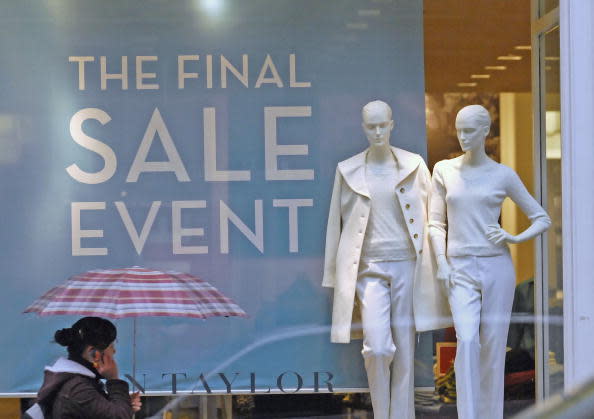The downfall of Ivanka Trump's brand isn't about her father
It is indisputable that Ivanka Trump’s apparel line has suffered greatly in recent months, but the first daughter’s affiliations may not be what’s killing her brand.
Ivanka Trump’s online sales fell 26% in January compared to January 2016, according to Slice Intelligence. Meanwhile, executives at Ivanka Trump are denying that the company is suffering. “The Ivanka Trump brand continues to expand across categories and distribution with increased customer support, leading us to experience significant year-over-year revenue growth in 2016,” Rosemary K. Young, senior director of marketing at Ivanka Trump, said in a statement last week.

It’s true that Grassroots movements like #GrabYourWallet — a campaign that targets retailers that sell Trump products — may have accelerated this push to ditch Ivanka Trump apparel and accessories. However, the brand was already in peril before Donald J. Trump became president, according to two retail analysts.
“Whether this was caused by politics or not, the brand was becoming less and less relevant. The election certainly was an acceleration of retailers choosing not to carry the line, but over time, the brand was not going to continue to perform at the Neiman Marcuses and Nordstroms (JWN) of the world,” Jessica Bornn, an analyst at Merchant Forecast, told Yahoo Finance.
Beyond people not wanting to purchase Trump-branded clothing, the core problem is actually entirely unrelated to politics. The real culprit is the dominance of athleisure, making Ivanka Trump’s structured dresses and pumps seem out of sync with how people dress these days — more casually, even to work.

US consumers spent $323 billion on apparel, footwear and accessories in 2014, which represents an additional $2 billion, or 1%, from the year before, according to The NPD Group. NPD analyst Marshal Cohen noted growth in the activewear market is driving that spending.
“Casual and ‘athleisure’ have taken on a life of their own. This is no longer a trend — it is now a lifestyle that is too comfortable, for consumers of all ages, to go away anytime soon.”
And other analysts agree. Morgan Stanley forecasts that the activewear industry could add $83 billion in sales by 2020. Deutsche Bank, in a research note last year, pointed out that athletic apparel was the biggest boost to the industry — up 4.1% from 2008-2015 on average. “As we believe the athleisure cycle is a bona fide trend with further dollar share shift ahead, we expect the disparity between athletic and non-athletic growth to widen in upcoming years,” read the report.
As Bornn noted, “We are experiencing a macro shift — very few women actually need to wear tailored pantsuits or dresses to the office anymore. People just aren’t dressing that formally. The business look is falling out of favor.”
But, it would be unfair to solely call out Ivanka Trump, because other brands in the same category are also struggling.

Ann Taylor (ANN), Kate Spade (KATE), Michael Kors (KORS) and other players in the mid-tier apparel space — dresses retail around $150 full price — are logging poor performance because they’re not matching people’s changing tastes, or are doing so inauthentically, noted Bornn.
Ivanka Trump: not a ‘destination’ brand
The other issue may be that Ivanka Trump’s clothes were never a “destination” category, according to Jan Rogers Kniffen, a former retail executive and the current CEO of J Rogers Kniffen WWE, a firm that consults investors in retail companies. For that reason, he’s not surprised upscale chains like Neiman Marcus and Nordstrom dropped the Ivanka Trump line. Particularly when shoppers peruse department stores, all the brands blur into one another. It’s hard to tell one dress from the next, Kniffen told Yahoo Finance.
It’s precisely these agnostic shoppers — all in search for comfortable athleisure and work-leisure — who have driven down sales. According to internal Nordstrom data reviewed by The Wall Street Journal, sales of Ivanka Trump’s line fell 32% last fiscal year, with particularly pronounced declines a few weeks prior to the US presidential election.

Bornn said companies like Ivanka Trump have not been able to pivot and adapt to the changing appetite of consumers. Brands like Lululemon (LULU) pioneered the athleisure market, albeit focused on the higher end audience, and now athleisure has chipped away at both workwear and hardcore athleticwear, said Bornn.
Though the athleisure space is growing increasingly crowded, it doesn’t change the fact that Ivanka Trump’s brand was under immense pressure — with or without her father’s influence.
Melody Hahm is a writer at Yahoo Finance, covering entrepreneurship, technology and real estate. Read more from Melody here & follow her on Twitter @melodyhahm.
Shopping for the Ivanka Trump brand is a nightmare in NYC
Snapchat’s crackdown on content sets itself apart from Facebook and Twitter
A top tech executive identifies a key responsibility of President-elect Trump
